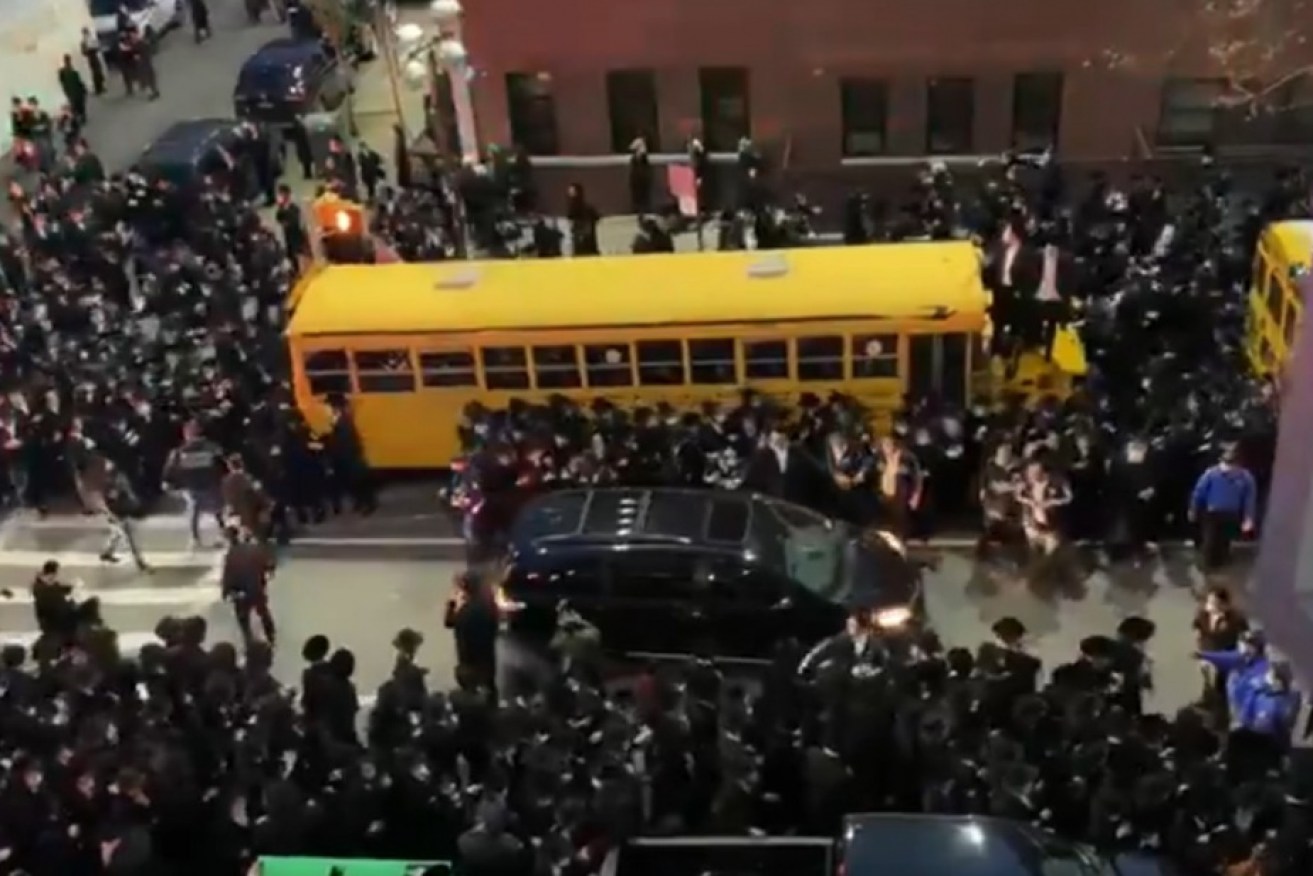New York cops break up ‘thousands’ gathered for rabbi’s funeral in pandemic


A massive crowd that turned out for the funeral of Rabbi Chaim Mertz prompted New York authorities to intervene. Photo: Twitter
New York’s mayor has been accused of stoking anti-Semitism after he blasted the Jewish community for a crowded funeral held in defiance of coronavirus restrictions.
Police broke up the massive crowd of ultra-Orthodox Jews who took part in a rabbi’s funeral amid a statewide shutdown and devastating death toll of 23,000.
Mayor Bill de Blasio ordered arrests which critics likened to rounding up the Jews in the Holocaust but walked back his comments after Jewish leaders called them discriminatory.
My message to the Jewish community, and all communities, is this simple: the time for warnings has passed. I have instructed the NYPD to proceed immediately to summons or even arrest those who gather in large groups. This is about stopping this disease and saving lives. Period.
— Mayor Eric Adams (@NYCMayor) April 29, 2020
City Police Commissioner Dermot Shea said 12 summonses were issued for a variety of offences at the Brooklyn gathering, which he estimated involved “thousands of people crammed onto one block”.
Mayor Bill de Blasio personally oversaw the dispersal of the Hasidic residents in Brooklyn’s Williamsburg section who had gathered late on Tuesday for the funeral of Rabbi Chaim Mertz, who died of COVID-19, the disease caused by the coronavirus.
A Jewish congregation had worked with police on a plan to close streets so the funeral could adhere to social-distancing rules, said Mitchell Silber, executive director at the Community Security Initiative, a program to protect Jewish institutions.
Both the rabbi’s congregation and the police were surprised at the number of people who attended, he said.
“This was a single event, planned by one congregation. The troubling incident last night should not negatively reflect on Hasidim, the Williamsburg community, Orthodox Jewry or the entire Jewish community,” Mr Silber told Reuters.
Scenes like this can set the process of reopening back weeks. Worse off, it risks more funerals. @NYPDnews is gonna have to camp out of every corner as long as people refuse to listen… pic.twitter.com/09kAk8pY64
— Menashe Shapiro (@menasheshapiro) April 29, 2020
The Hasidic community, who dress and wear their hair in the customs of their European ancestors, is the subject of a popular Netflix series, Unorthodox, which tells the story of a young woman escaping the strict faith.
Some Jewish leaders criticised Mr de Blasio, who wrote on Twitter that he had instructed the city’s police department to “summons or even arrest those who gather in large groups”.
“This is about stopping this disease and saving lives,” the mayor wrote.
The criticism was for Mr de Blasio’s having addressed the tweet to “the Jewish community, and all communities”.

New York’s Hasidic Jews are conspicuous for their traditional attire and headwear. Photo: Getty
Jonathan Greenblatt, the CEO of the Anti-Defamation League noted that New York City is home to more than one million Jews.
“The few who don’t social distance should be called out – but generalising against the whole population is outrageous especially when so many are scapegoating Jews,” Mr Greenblatt wrote on Twitter.
Rabbi Mark Dratch, executive vice president of the Rabbinical Council of America representing Orthodox rabbis, said he was concerned the comments could encourage anti-Semitism.
“We are very concerned about the mayor’s comment which stigmatises an entire community for the irresponsible behaviour of a small group,” Mr Dratch said in an email to Reuters.
At a news conference with Shea, Mr de Blasio said he regretted the way he expressed concern about the gathering of mourners but that he spoke “out of passion” for the safety of the people of his city, the epicenter of the country’s crisis.
“Again this is a community I love, this is a community I’ve spent a lot of times working with. And if you saw anger and frustration, you’re right,” Mr de Blasio said.
“I spoke out of real distress and people’s lives were in danger before my eyes, and I was not going to tolerate that.”
-with AAP








